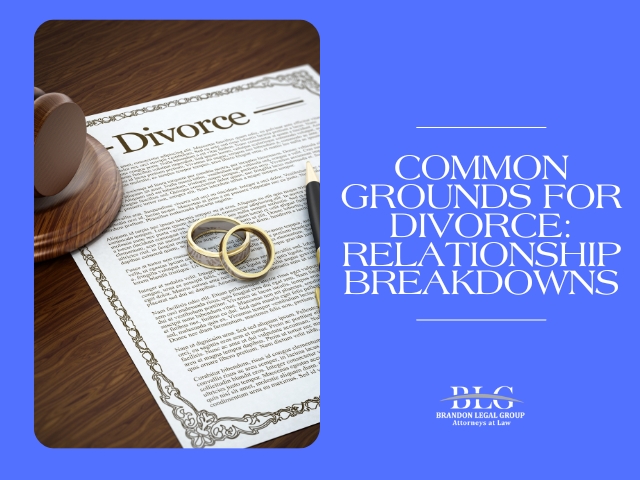Divorce, the legal dissolution of a marriage, is a process many couples face worldwide. There are numerous reasons for divorce, each unique to the team involved. This article delves into six common grounds for divorce, punctuated with dramatizations for a clearer understanding of these complex emotional landscapes.
Lack of Communication
Effective communication is the cornerstone of any successful relationship. When couples cannot express their thoughts, feelings, or needs clearly to one another, it can lead to misunderstandings, resentment, and ultimately divorce. The lack of effective communication in a marriage can often lead to misunderstandings and unresolved conflicts, which may erode the relationship and potentially result in divorce over time.
The following is a DRAMATIZATION AND NOT AN ACTUAL EVENT: Consider the fictional case of Lisa and Tom. Over time, they started sharing less and less about their feelings and concerns. The lack of communication led to an increasing emotional distance until they realized they were living as strangers rather than a married couple.
Infidelity
Infidelity is another common reason for divorce. The breach of trust resulting from an affair can irreparably damage a relationship, leaving the other spouse feeling betrayed and often leading to a divorce. Whether emotional or physical, infidelity in a marriage can profoundly damage the trust between spouses, often leading to feelings of betrayal, anger, and hurt. This breach of trust due to infidelity can escalate tensions and conflicts in a relationship, potentially leading to the painful decision of divorce.
The following is a DRAMATIZATION AND NOT AN ACTUAL EVENT: Take the case of the fictional couple, Adam and Emily. After discovering Adam’s affair, Emily struggled with feelings of betrayal, leading her to file for divorce as she couldn’t see a path to rebuild trust.
Financial Issues
Money-related issues can strain any relationship, leading to constant disagreements and conflict. Divergent views on spending, saving, and financial goals often lead couples to part ways. Financial difficulties or disagreements over money management in a marriage can generate significant stress and discord, potentially undermining the relationship’s stability and leading to its eventual breakdown.
The following is a DRAMATIZATION AND NOT AN ACTUAL EVENT: Mark and Jennifer, a fictional couple, constantly argue about money. While Jennifer was a saver, planning for their future, Mark was a spender, believing in enjoying the present. Their contrasting financial philosophies eventually led to their divorce.
Addiction
Addictions, whether to substances or behaviors like gambling, can lead to divorce. The unpredictability, financial stress, and emotional turmoil associated with addiction can cause significant strain on a marriage. Marriage addiction, whether to substances, gambling, or other behaviors, can create a highly stressful environment, often leading to substantial emotional, financial, and relational strain. The cycle of addiction can erode trust, promote unhealthy dynamics, and may result in the breakdown of the marital relationship. In such cases, an experienced family law attorney can guide legal options and resources available, helping to navigate the complex separation or divorce process while considering the specific challenges that addiction presents.
The following is a DRAMATIZATION AND NOT AN ACTUAL EVENT: In a fictional example, Sarah divorced her husband, John, due to his uncontrollable gambling addiction. Despite numerous attempts at intervention and treatment, John’s addiction continued, causing financial and emotional distress, leading Sarah to seek divorce.
Incompatibility
Sometimes couples realize over time that they are fundamentally incompatible. Differences in personality, interests, values, or life goals can lead to disagreements and separation.
The following is a DRAMATIZATION AND NOT AN ACTUAL EVENT: Consider the fictional couple, Alex and Amy. Alex was adventurous, always seeking excitement, while Amy preferred a quiet, routine life. Over time, their conflicting lifestyles led to increasing dissatisfaction and disagreements, culminating in a decision to divorce.
Lack of Intimacy
Physical and emotional intimacy is crucial in maintaining a strong marital bond. The lack of familiarity can make couples feel more like roommates than romantic partners, leading to loneliness and discontent, often resulting in divorce.
The following is a DRAMATIZATION AND NOT AN ACTUAL EVENT: In the case of the fictional couple, Rachel and Richard, their relationship became increasingly platonic. The absence of intimacy made Rachel feel neglected and unloved, ultimately prompting her decision to divorce.
Abuse
Abuse, whether physical, emotional, or psychological, is a significant reason leading to divorce. The scars an abusive partner leaves can be severe and long-lasting, making it imperative for the victim to escape the harmful environment.
The following is a DRAMATIZATION AND NOT AN ACTUAL EVENT: Consider the fictional couple, Bella and Ethan. Bella endured years of emotional abuse from Ethan, gradually weakening her self-esteem. Upon realizing the detrimental effects of the relationship on her well-being, Bella made the courageous decision to divorce Ethan.
Loss of Individual Identity
In some marriages, one partner may feel they have lost their identity. This often happens when one spouse sacrifices personal goals, hobbies, or careers for the sake of the marriage or family. The loss of individuality in a marriage, often resulting from intense co-dependence or the neglect of personal growth, can lead to dissatisfaction and resentment, potentially becoming a significant factor in the decision to divorce.
The following is a DRAMATIZATION AND NOT AN ACTUAL EVENT: Meet the fictional couple, Kate and John. A once-ambitious woman, Kate put her career on hold to support John’s profession and raise their children. Over time, Kate felt she had lost her identity and decided to divorce John to reclaim her sense of self.
Parenting Disputes
Conflicts over child-rearing can create significant strain in a marriage. Differing views on discipline, education, or core values can escalate into constant disagreements, driving a wedge between spouses.
The following is a DRAMATIZATION AND NOT AN ACTUAL EVENT: Consider the fictional couple, Olivia and Peter. Olivia believed in a structured upbringing for their children, while Peter favored a more laid-back approach. Their opposing parenting styles led to constant arguments, ultimately resulting in divorce.
The Role of a Divorce Attorney
A divorce attorney can be an invaluable asset throughout the divorce process. From ensuring fair distribution of marital assets and debts to handling custody matters, a divorce attorney can navigate the legal complexities on behalf of the client. Moreover, they provide emotional support and objectivity, helping clients make informed decisions about their future.
The following is a DRAMATIZATION AND NOT AN ACTUAL EVENT: The fictional character, Lucy, decided to divorce her husband due to irreconcilable differences. Enlisting the help of a seasoned divorce attorney, Lucy was guided through the divorce process, with the attorney negotiating on her behalf and ensuring a fair settlement. The attorney’s expertise was instrumental in helping Lucy navigate this challenging phase and move toward a brighter future.
Conclusion
While this exploration is not exhaustive, it highlights some common reasons couples divorce. Each journey is profoundly personal and fraught with emotional complexities. A knowledgeable divorce attorney can provide much-needed guidance and support during such a challenging time, assisting individuals in transitioning to their new lives post-divorce.
Conclusion
Divorce is a complex process, both legally and emotionally. Understanding its common grounds can provide valuable insights for couples seeking to nurture their marriages and those facing the difficult decision to part ways. While the reasons for divorce vary from couple to team, the journey through it remains a deeply personal and often challenging experience.
